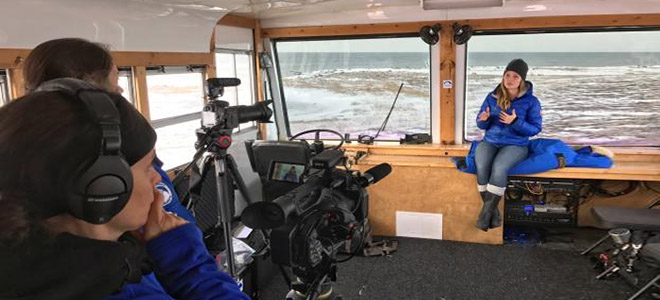
CU Boulder Today
January 2017
Graduate student Barbara MacFerrin had never seen a bear in the wild in Colorado. In November, she went to the Arctic and saw a dozen polar bears.
As part of a team led by Jennifer Kay, assistant professor in the Department of Atmospheric and Oceanic Sciences (ATOC) at CU Boulder, they spent a week on the Arctic tundra making educational videos to help teach students about climate science.
MacFerrin, who is working toward a master’s degree in the ATLAS Institute’s Technology, Media and Society program, was the team’s videographer. Seeing polar bears in their habitat was a highlight personally and professionally for MacFerrin, who has developed an interest in addressing the impacts of climate change on Arctic and alpine communities through her videos and photographs.
“The whole experience of going to the Arctic and seeing the polar bears and the northern lights was so rewarding,” she said. “At the same time I felt despondent. The bears were clearly hungry and wanted to be out on the sea ice hunting, but the ice was late forming this year. We witnessed a polar bear cannibalizing the remains of another, which is something that happens when they’re stuck on land with limited food resources.”
Kay’s team traveled to Churchill, Manitoba—known as the polar bear capital of the world—where each fall polar bears outnumber people when the bears gather along the shores of Hudson Bay to wait for sea ice to form. Listed as a threatened species, polar bears depend on sea ice to hunt for seals, but because the Arctic is rapidly warming, their hunting grounds are dwindling.
The 5-minute videos explore specific climate science learning goals for non-science majors. The team is making two versions of the videos: one with polar bears and one without. Using the videos, the team will explore the following questions: Does incorporating polar bears into the classroom help with student engagement? Does including polar bears as an emotional hook improve student learning of core science concepts?
An atmospheric scientist, Kay is a fellow at the Cooperative Institute for Research in Environmental Sciences (CIRES), a research institute sponsored jointly by CU Boulder and the National Oceanic and Atmospheric Administration to study Earth systems.
Kay’s team collaborated with Polar Bears International, a nonprofit organization whose mission is to conserve polar bears and the sea ice they depend on. The trip was funded by a grant awarded to Kay as a National Science Foundation CAREER Award recipient. Read more …

